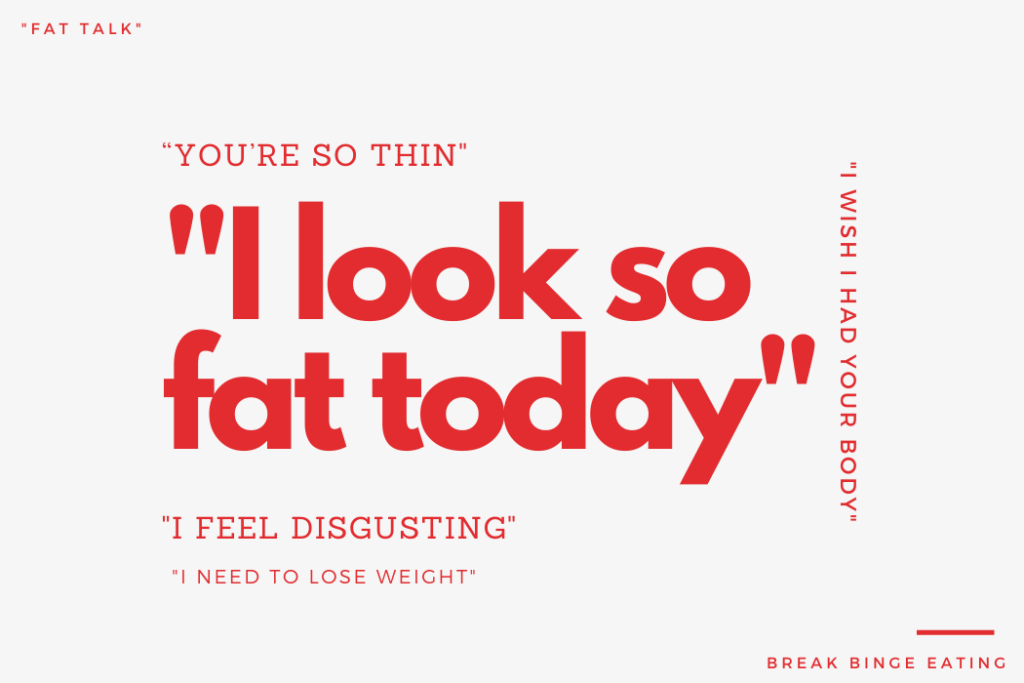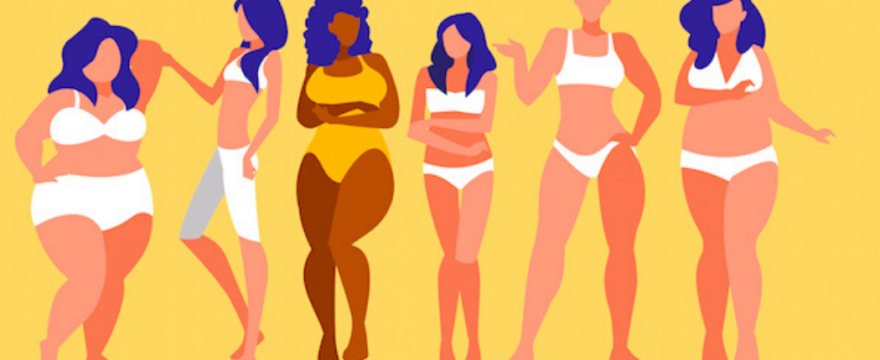Body image is a broad, multifaceted concept that we hear about almost daily.
It essentially concerns how we think, feel, perceive, and behave towards our body and its parts 1Grogan, S. (2016). Body image: Understanding body dissatisfaction in men, women and children: Routledge.
Whilst we should all know the importance and benefits of valuing and appreciating our body for what it is and what it can do, the unfortunate reality is that most people – both young and old – experience a poor body image or have a distorted self-image (also known as “self-image” disorders).
No one wants to experience a bad body image – it doesn’t feel nice to scrutinize and loathe what you see in the mirror.
Making matters worse, a poor body image is the strongest risk factor for the development of an eating disorder 2Stice, E. (2002). Risk and maintenance factors for eating pathology: a meta-analytic review. Psychological Bulletin, 128, 825-848.
In this article, I want to focus on body image and provide an answer to all the questions you might have in relation to this topic, including the signs and symptoms of negative body image, causes of negative body image, and how to treat negative body image.
Table of Contents
Signs and symptoms of negative body image
As we spoke about, body image is multifaceted; it comprises cognitive, affective, perceptual, and behavioural components.
The “broadness” of this concept means that there are many different signs and symptoms of poor body image.
Importantly, signs and symptoms may be expressed differently across people.
That is, one person’s experience of negative body image can be completely different to another person’s experience.
Let’s take a look at the range of negative body image signs and symptoms.
- General unhappiness with one’s body as a whole or its specific parts
- Equating one’s self-worth on the basis of what they look like or weigh
- Obsessively scrutinizing one’s body in front of a mirror or reflection
- Repetitive negative thoughts about one’s body that interferes with many life domains
- Refusal to look at one’s body due to anxiety
- Perceiving one’s body to be larger than it really is
- Extreme anxiety over gaining weight
- Making disparaging comments about one’s body and frequent comparison of one’s shape and size to other people
- Feelings of being trapped in a larger body
As you’ll see, there are a range of different signs and symptoms.
These signs and symptoms are important to spot, because they’ve each been shown to predict many different poor health outcomes, like eating disorder symptoms, functional impairment, and mental health problems 3Linardon, J., Phillipou, A., Castle, D., Newton, R., Harrison, P., Cistullo, L. L., . . . Brennan, L. (2018). The relative associations of shape and weight over-evaluation, preoccupation, dissatisfaction, and fear of weight gain with measures of psychopathology: An extension study in individuals with anorexia nervosa. Eating behaviors, 29, 54-58.
Causes of Negative Body Image
When discussing body image, an important question that arises concerns how a negative body image is caused, or what influences body image.
There’s no simple answer.
There are range of factors that interact together to influence or cause a bad body image.
Luckily, these questions have been studied for decades, so we have a fairly good idea on what causes a distorted self-image.
Let’s review the five most important causes of a poor body image.
1. Appearance Ideal Internalization
Internalisation of the appearance ideal is the strongest predictor of negative body image 4Thompson, J. K., & Stice, E. (2001). Thin-ideal internalization: Mounting evidence for a new risk factor for body-image disturbance and eating pathology. Current directions in psychological science, 10, 181-183.
It refers to the extent to which one “buys in” to the notion that being thin, muscular, or lean will bring forth value, success, and beauty.
We live in a society that values certain body types; men are expected to be lean and muscular while women are expected to be thin.
There’s an unspoken belief that if you achieve the ideal body type, you’ll live a much happier and more successful life.
People who internalize this (believe it) are much more likely to experience body image problems, as it will soon be recognised that these ideals are largely unachievable.
Let me tell you 10 assumptions we generally hold towards our appearance. These assumptions promote the appearance ideal internalization.
- Physically attractive people have it all
- Who I am as a person depends on how I look
- I should try my hardest to look my best all the time
- When people see me, the first thing they will notice is what’s wrong with my appearance
- If people knew how I really look, they would probably like me less
- By managing my physical appearance, I can control my social and emotional life
- My appearance is responsible for nearly all that has happened in my life
- If I could look like how I wanted to, I’d be heaps happier
- Societies messages make it impossible for me to happy with my body
- The only way I could ever accept my looks would be to change them
2. Self-Objectification
Women who self-objectify their body are likely to experience body image problems 5Fredrickson, B. L., & Roberts, T.-A. (1997). Objectification theory: Toward understanding women’s lived experiences and mental health risks. Psychology of women quarterly, 21, 173-206.
Let me explain.
Women in Western societies are routinely sexually objectified; they are evaluated and valued predominantly based on their physical appearance.
Experiences of sexual objectification routinely occur in interpersonal encounters and mass media.
Living in a cultural milieu of sexual objectification can socialise women to engage in self-objectification, meaning that they evaluate and value their own body based on appearance.
This self-objectification can cause women to be extremely unhappy with their own body.
3. Body Comparisons
The extent to which you compare your body with other people also influences negative body image.
Why would these comparisons cause a negative body image?
Well, when we make comparisons, we tend to make unfair ones.
When we compare ourselves with someone else, we tend to look at all the things we like about the other person’s body.
In contrast, when we evaluate our own body, we tend to dwell on and scrutinize all the things we don’t like.
This causes us to feel ashamed or unhappy with our body image.
4. Fat Talk

Fat talk occurs when peers talk about their appearance in a negative light.
We’ll often here young girls say “I look so fat today, and I feel disgusting”.
Fat talk promotes a negative body image because it reinforces the appearance ideals and encourages girls to strive for these ideals.
5. Perfectionistic Tendencies
Being a perfectionist can also cause a negative body image.
This is because perfectionists are never happy with their body and are always trying to modify it in a way that aligns with the ideals we see in society.
No matter how thin or muscular a perfectionists body is, they’ll always find a way to critique it and be unhappy with it.
Body Image Therapy? How to Reduce a Negative Body Image
There are certain interventions purely dedicated towards helping people overcome a negative body image.
These interventions are empirically supported, meaning that several research studies have proven their effectiveness 6Alleva, J. M., Sheeran, P., Webb, T. L., Martijn, C., & Miles, E. (2015). A meta-analytic review of stand-alone interventions to improve body image. PloS one, 10, e0139177.
Most importantly, these interventions are often used for people across the entire lifespan. So, the notion that older adults don’t suffer from body image problems because they are more accepting of who they are doesn’t really hold and isn’t what we see in reality.
Let’s take a look at some of the key intervention strategies used in body image therapy
1. Understanding the Origins of Your Negative Body Image
Before you’re able to successfully address any negative body image tendencies, you first need to understand why you came to dislike your body so much in the first place.
Body image therapy utilizes expressive writing to help you explore the origins of your negative body image.
Doing this will help you better understand what it is that you might need to address specifically in subsequent exercises
2. Mindfully Accepting Your Body Image Experiences
In body image therapy, you will come to realize that negative body image takes over your life – you constantly think about your body, feel negatively towards it, and behave in ways that try to stop this from happening.
What you instead need to do is be more mindful and accepting of these situations.
In other words, teaching yourself to focus your attention on the here and now, in a non-judgmental fashion.
Mindfulness is a way of consciously “stepping back” and really letting those negative thoughts and feelings towards your body subside.
In body image therapy, you are taught how to be more accepting, how to engage in body scans, and how to effectively meditate.
3. Correcting Your Cognitive Distortions
We generally have a negative body image because of some distorted thoughts we have towards our body.
For example, you might believe that your entire self-worth is dictated by how you look or how much you weigh.
Body image therapy seeks to correct these fault assumptions, beliefs, and thoughts.
It does so via a range of cognitive restructuring exercises, exposure techniques, and self-monitoring strategies.
4. Being Kind to Your Body
When we an unhappy with our body, we are generally mean to it.
We don’t treat it well at all.
In body image therapy, there’s not only a focus towards minimizing a negative body image, but also on promoting a positive body image.
You will learn to value, respect, and appreciate your body and all its wonderful capabilities.
Body image therapy will teach you how to speak kindly to your body via positive self-affirmations, take advantage of all the impressive functions in can perform via behavioural activation, and, overall, teach you to love the skin you’re in.
If you’re wanting to improve your body image, then I’d highly recommend checking out Thomas Cash’ self-help program.
It’s a proven program that can help people finally stop loathing their body and appreciate it for what it is.
References

Love this article
Thanks Tania! Means a lot.